The Pandemic changed people’s thinking and now most would welcome government-sponsored job training and other interventions according to Pew Research Institute
BY KAT DEVLIN, SHANNON SCHUMACHER AND J.J. MONCUS
The coronavirus outbreak has caused, among other things, a debate around how to best rebuild national economies ravaged by the pandemic. Across the United States, France, Germany and the United Kingdom, significant shares believe their economic system needs either major changes or a complete overhaul, according to a Pew Research Center survey conducted in the late fall of 2020. Few in the four countries say their economy does not need any changes.
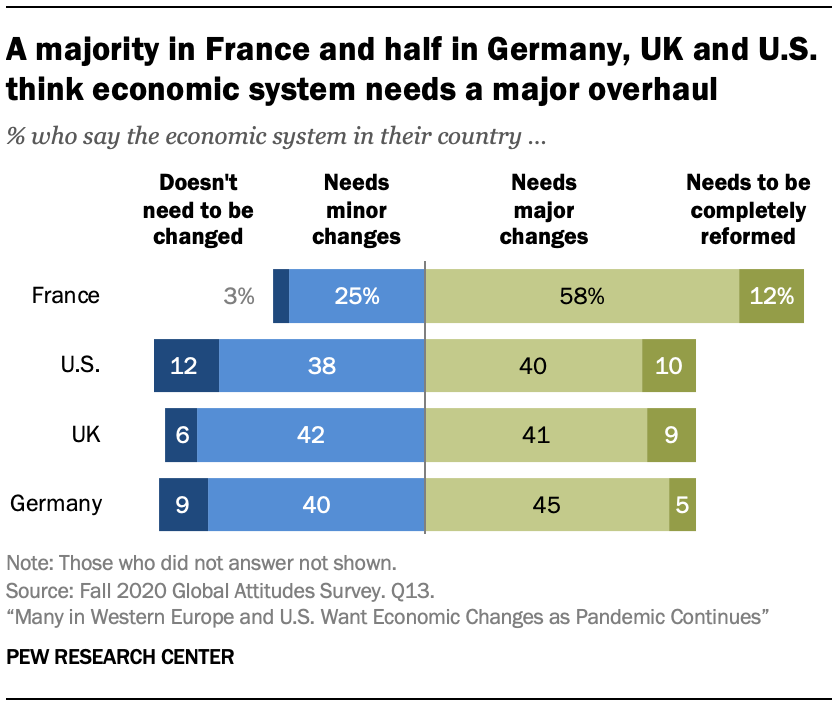

The desire for change is strongest in France, where seven-in-ten believe the economic system in their country needs either major changes or to be completely reformed. Half share this view in the U.S., UK and Germany, while around four-in-ten in these three nations say minor changes are warranted.
Few would opt for no adjustments to the economic system, ranging from 3% in France to 12% in the U.S. Those who think the overall economic situation in their country is bad are more likely to call for major or total reforms to the system.
When asked about various economic interventions the government could undertake, publics generally voice high levels of support for each potential program. Across five different economic policies, large majorities in all four countries think nearly all are important.
Of the five policies tested, the idea of government-sponsored job and skills training for workers garners the highest shares saying it is very important for their national government to take such action in all countries surveyed.
Sizable shares in these countries also believe it is very important for their government to implement policies targeted at helping those struggling financially, building more public housing, and increasing government benefits to the poor, all three of which are of high import for around four-in-ten or more in each country.
Likewise, policies aimed at redistribution – raising taxes on the rich and providing a universal basic income – are very important priorities for at least three-in-ten.
Across countries, those with higher levels of income are less likely to support many of these policies. And those who want major changes or total reforms to their national economic systems are also more likely to see these interventions as very important.
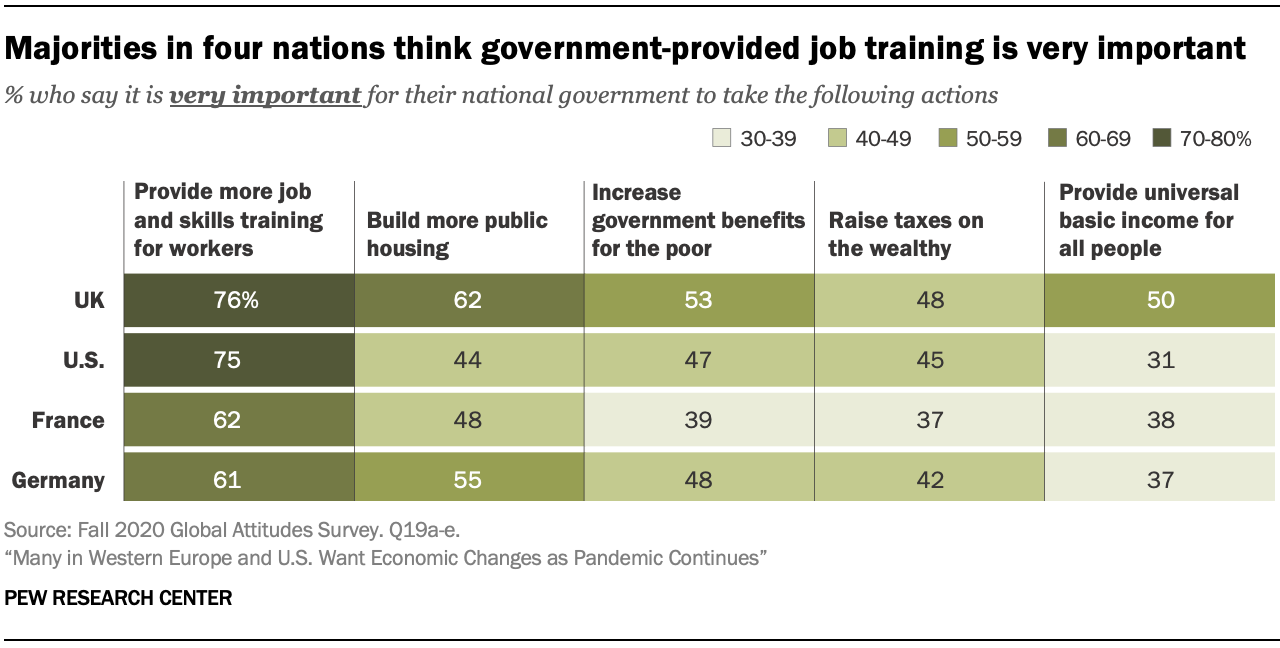

Government regulations on business garnered more mixed public assessments in the four countries. Americans, in particular, generally see government regulation of business as a bad thing for the country, a view held by half of U.S. adults. In the three European countries, at least half see regulation as a good thing. Those on the ideological right are especially likely to see regulation negatively in the U.S. and Germany.
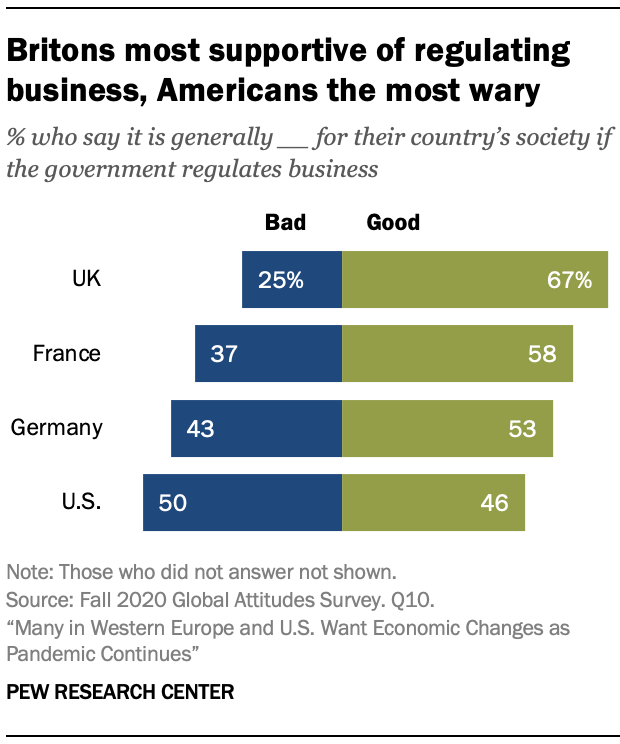

Still, many hold out hope for their personal economic mobility despite the devastating economic effects of the pandemic in each of these countries. Two-thirds or more in the U.S., Germany and the UK believe they have a good chance of improving their standard of living, and roughly half in France share that opinion. Young people ages 18 to 29 are especially optimistic in France, the UK and the U.S., while Germans of all ages express about the same level of optimism.
These are among the findings of a Pew Research Center survey conducted from Nov. 10 to Dec. 23, 2020, among 4,069 adults in France, Germany, the UK and the U.S.
Many want major or complete economic reforms amid the pandemic
In the midst of a global pandemic that brought many national economies to a halt, half or more in the four countries surveyed say their country’s economic system needs at least major changes, with small shares in each country saying it needs to be completely reformed.
A full seven-in-ten adults in France agree their country’s economic system needs at least a major overhaul, with 12% going so far as to say it needs complete reform. At the time of fielding the survey last fall, France had instituted a second nationwide lockdown, and the country’s unemployment rate had risen to its highest level in two years.
In the U.S., the UK and Germany, sizable shares fall on both sides of the issue. While half in each country say that their nation’s economic system needs at least major changes, roughly four-in-ten say it only needs minor changes. Small but non-negligible shares think no changes are needed at all, ranging from 12% in the U.S. to just 6% in the UK.
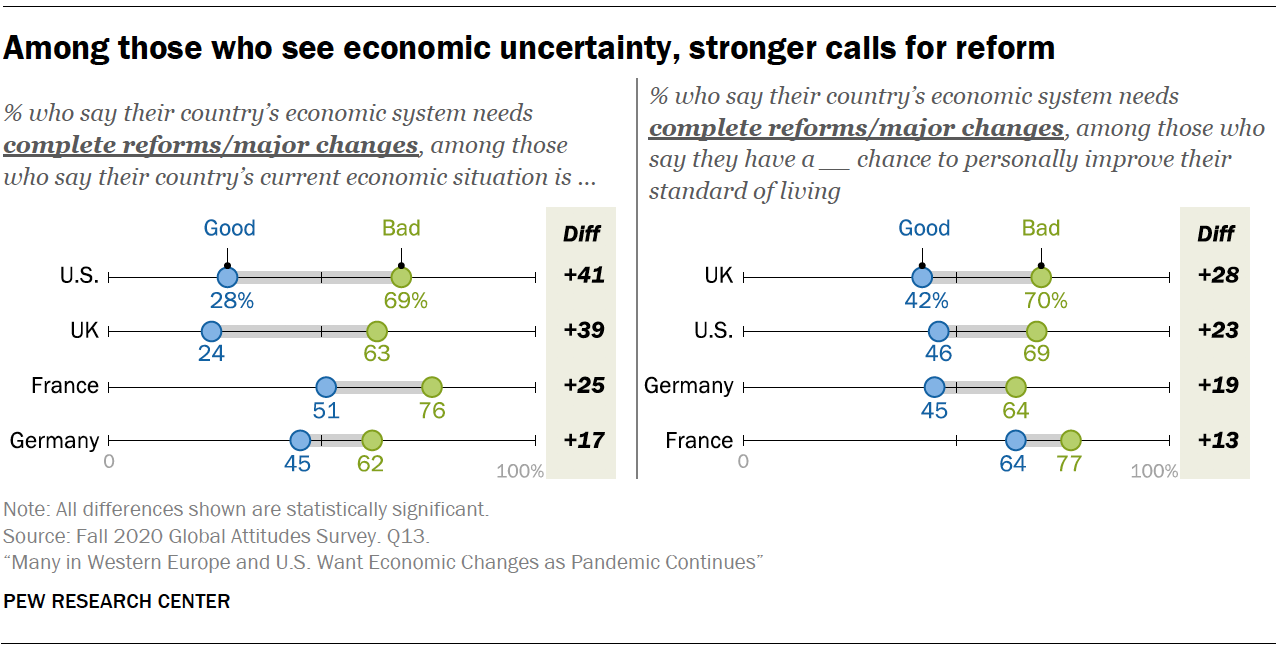

Calls for reform are more prevalent among those who think their country’s economy is not faring well. In the U.S., a large majority (69%) of those who say their country’s economic situation is currently bad also say that the system needs major changes. Just 28% of those who say the economy is currently good support such reform, a 41 percentage point difference.
Views in the UK are similar: 63% of Britons who say the UK’s economy is currently poor call for reforming their economic system; about a quarter who say the economy is good hold the same view on reform. Double-digit differences are also present in France and Germany as well.
Similarly, those who say they have little chance of personally improving their standard of living are more supportive of reform in all four countries. In the UK and U.S., roughly seven-in-ten of those who are pessimistic about improving their standard of living say their economic system needs significant changes; fewer than half of those who are positive on their standard of living say the same.
Ideology colors views on the topic of reform. The largest difference by far again comes from the United States, where 77% of left-leaning respondents say the country’s economic system needs at least significant changes.1 Fewer than half of Americans in the center and only a third of those on the right share this view.
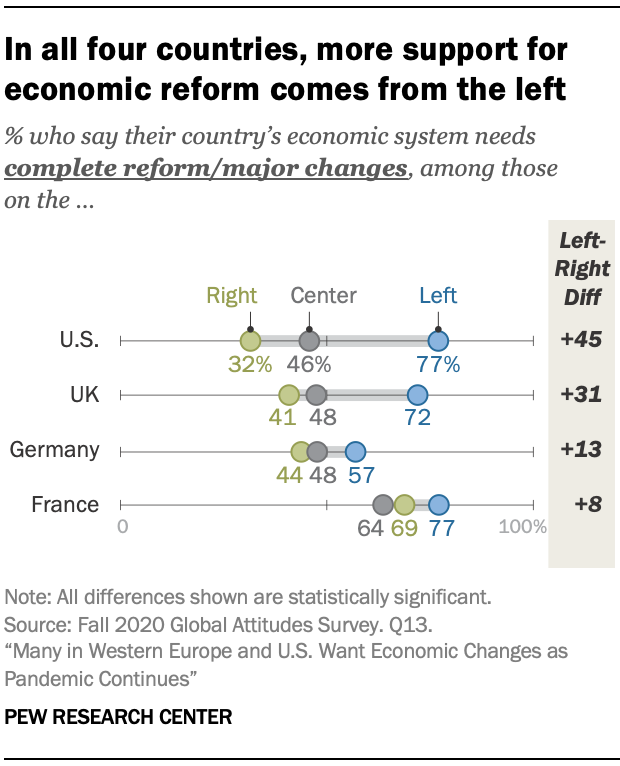

In the UK, the spread is similar: Roughly three-quarters of those on the left support either major changes or complete reform of the economic system, while about half in the center and four-in-ten on the right say the same. The differences are more modest in Germany, where support for reform is generally more mixed among all ideological groups, though with those on the left slightly more supportive than those on the right.
In France, a full 77% on the left support reform – the same share as in the U.S. The difference, though, is that strong majorities on the center and right agree (64% and 69%, respectively).
Those who identify as Remainers in the UK are more supportive than those who identify as Leavers of a major overhaul of the UK’s economic system. A majority of Remainers (57%) say the system needs either a complete reform or major changes, while just 43% of Leavers agree.
Strong support for national governments to expand several types of economic assistance
All five economic policy proposals included on the survey receive widespread support. At least half of those surveyed in each of the four countries say that each policy is at least somewhat important, and most proposals garner support from more than six-in-ten in each country. Some of these approaches register noteworthy shares of the public who say they are very important for the national government to pursue.
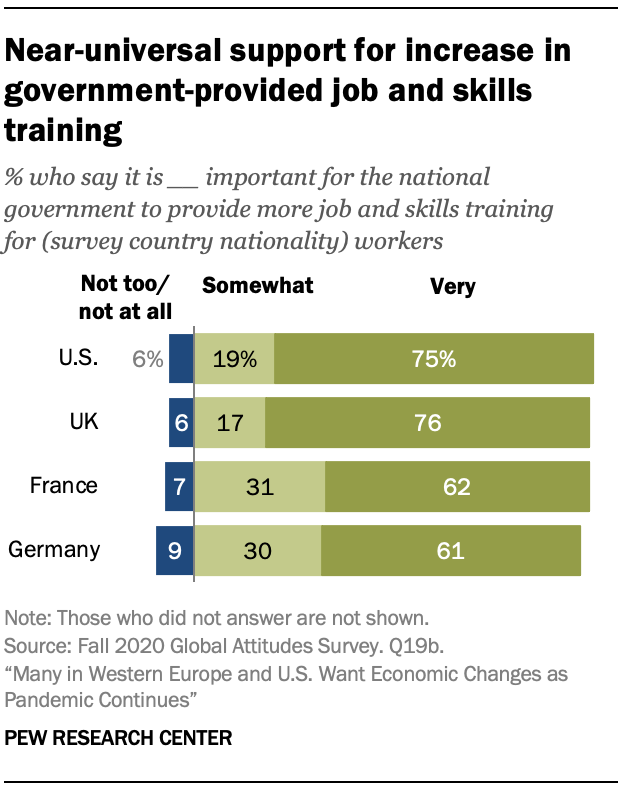

The idea of the national government providing more job and skills training for workers has the most support: About six-in-ten or more in each country say it is very important that the government do this. Support for this idea is high across all income and age groups in each country, and about nine-in-ten or more in each of the four countries say that it is very important or somewhat important the national government provides such training.
Support for building more public housing also stands out, as 44% or more in each of the countries say that it is very important. Support for this is highest in the UK and Germany. In each of the four countries, larger shares of those in the lowest income groups say expanding public housing is very important than do those with higher incomes. The same is true in the U.S., UK and France when it comes to political ideology: Those on the left are more likely than those on the right to say building more public housing is important.
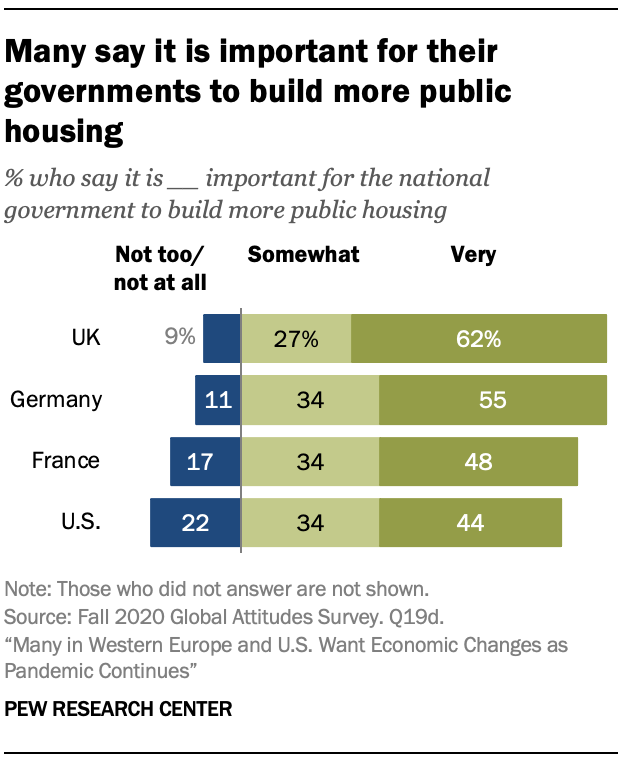

Increasing government benefits for the poor is also a well-received idea in the four countries surveyed. About half in the UK, Germany and U.S. say increased benefits are very important, while about four-in-ten say the same in France. In all four countries, support is particularly strong among those with less income and, with the exception of Germany, people on the ideological left.
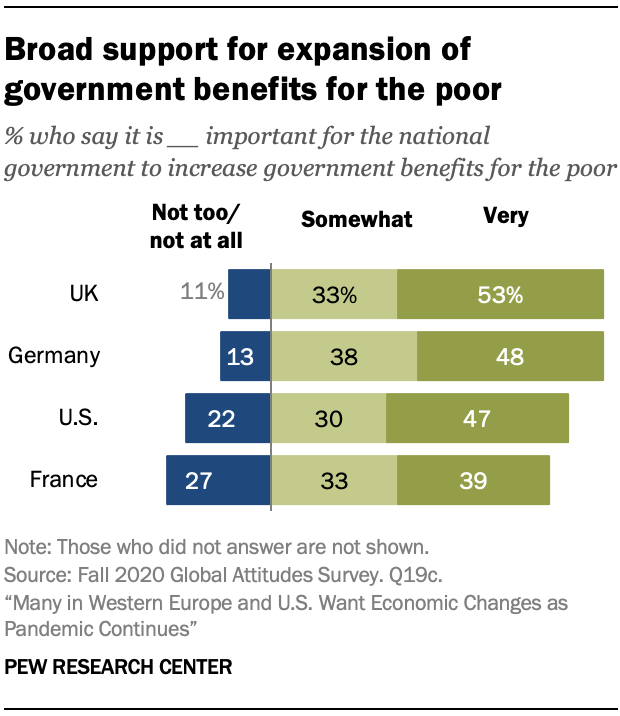

Raising taxes on the wealthy receives somewhat less support from the four publics. Support is highest in the UK, where about half (48%) say it is very important to raise taxes on the wealthy. In each of the four countries surveyed, those on the ideological left are more likely than those on the right to say it is very important that the national government raise taxes on the rich.
Americans, Britons, French and Germans in the highest income group are more averse to raising taxes on the wealthy than those in the middle or lowest income groups. Still, around four-in-ten of the highest earners surveyed in the U.S. and UK said this policy is very important for the national government, while about a quarter of higher-earning French and Germans said the same.
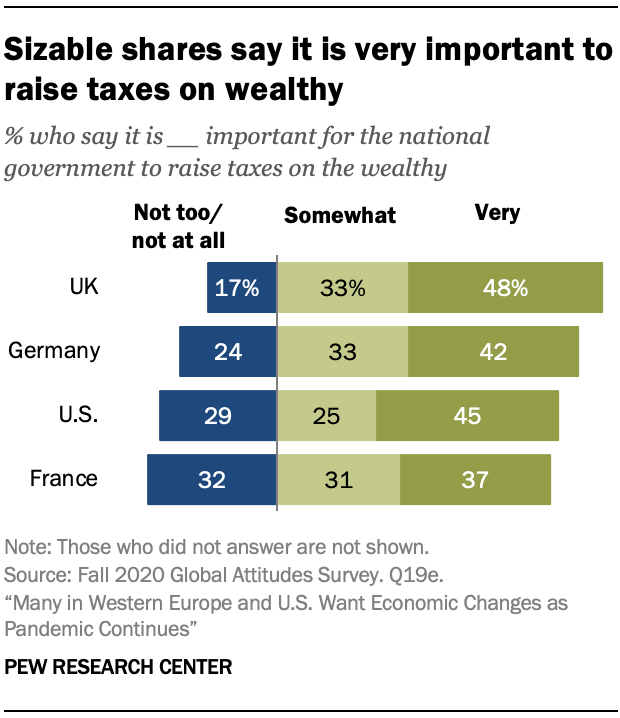

The idea of a government-provided universal basic income (UBI) received the least support in each of the four countries among the policies in the survey. UBI gained notoriety in the U.S. as a central point of Andrew Yang’s 2020 presidential bid. It has been tested on smaller scales in places like Finland and Kenya, and a form of UBI has been in effect in the oil-rich U.S. state of Alaska since 1982.
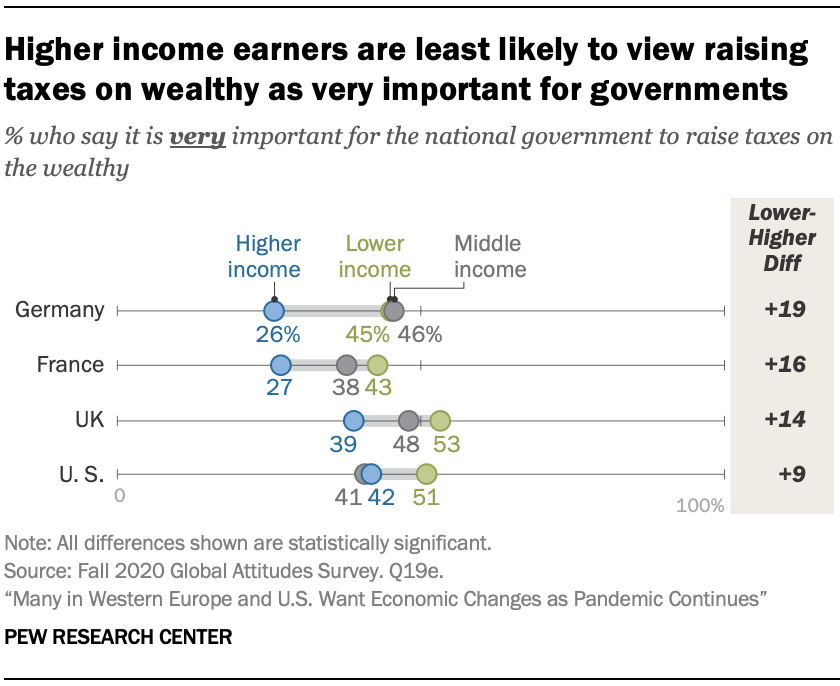

Around a third of Americans and about four-in-ten French and Germans say it is very important for the national government to provide a UBI, while half of Britons say the same. Although UBI received the least support of the five policies asked about, about half, and as many as 79%, in the countries surveyed say it is at least somewhat important. In Germany, where a UBI trial is underway, and the UK, where more than 100 lawmakers are calling for a pilot program, people of all ages are about equally likely to say UBI is important. But younger Americans and French are especially likely to hold this view, as are those on the ideological left in all four countries.
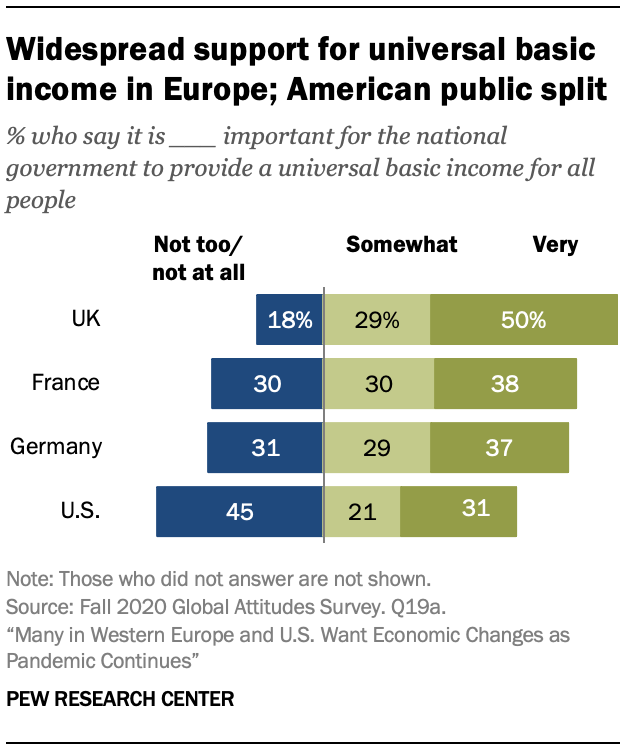

There are stark differences of opinion on UBI across income groups. In each of the four countries surveyed, those with the lowest levels of income are the most likely to say it is very important for the national government to provide a UBI. This difference is largest in the U.S., where 51% of those in the lowest income group are very supportive of this, compared with only 16% in the highest income group.
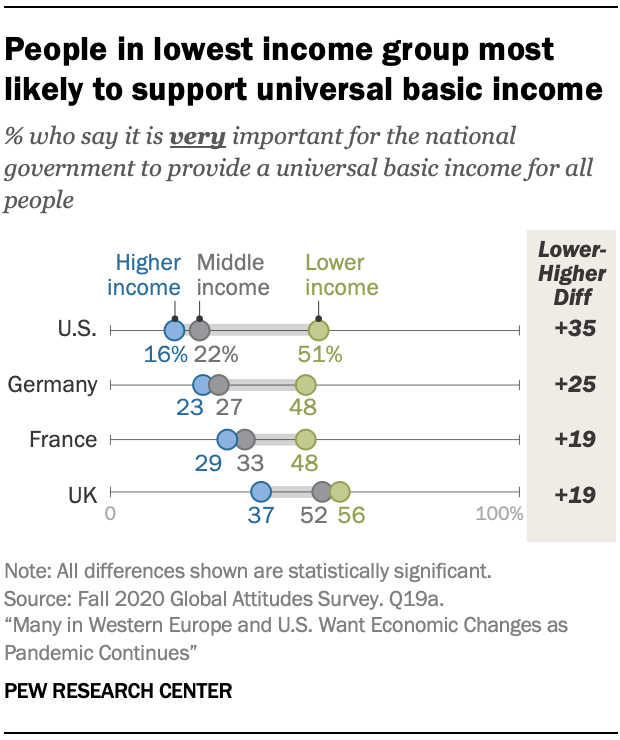

Americans and Germans with less education are more likely to say it is very important for the national government to provide a universal basic income than are those with more education.
Across countries, views on the value of regulation are mixed
When asked about government regulation of business, a full two-thirds of Britons say that it is a good thing for their country, and nearly six-in-ten in France say the same. Views on regulation in these countries are largely unchanged from when the question was last asked in 2017.
Roughly half of Germans agree that regulation is generally good for their society, though 43% say it is bad for Germany. Notably, views against regulation have increased slightly since the question was last asked (36% in 2017 vs. 43% now).
There is less support for regulation in the U.S., where half say it is bad for society, while 46% believe it has a positive effect.
In France and the U.S., young people are more likely than their older counterparts to consider regulation a good thing; in both countries, those with more education are also more likely to see regulation as good.
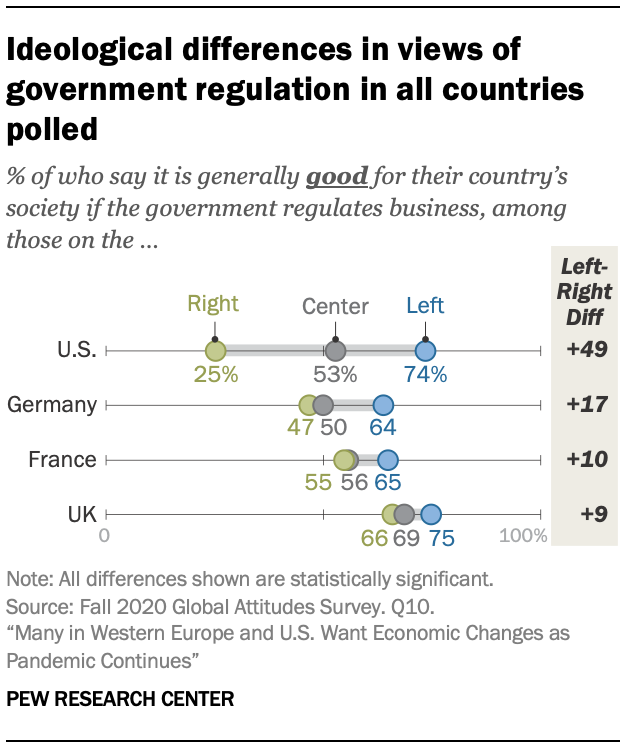

In all four countries, ideology cleaves differences in views on regulation. The largest gap by far is in the U.S., where nearly three-quarters of those on the left believe regulating business is good, while just a quarter of those on the right say the same.
Differences are more modest in the other countries polled. In Germany, 64% of those on the left say regulation is good, and roughly half of those on the right agree. In France and the UK, while a majority of all ideological groups see benefits to regulation, those on the left are moderately more positive than right-leaning respondents.
Most say they have a good chance to improve standard of living in U.S., Germany and UK
Despite the coronavirus crisis and the associated economic recession, half or more of those in the four countries surveyed said they have at least a somewhat good chance of improving their standard of living when the survey was fielded in November and December 2020. Compared with the other three nations, public opinion is more divided in France, where 51% think their prospects of improving their livelihoods are somewhat or very good, compared with 48% who say they are somewhat or very bad. And Americans stand out for their optimism, as nearly three-in-ten believe their chances are very good when it comes to improving their standard of living.
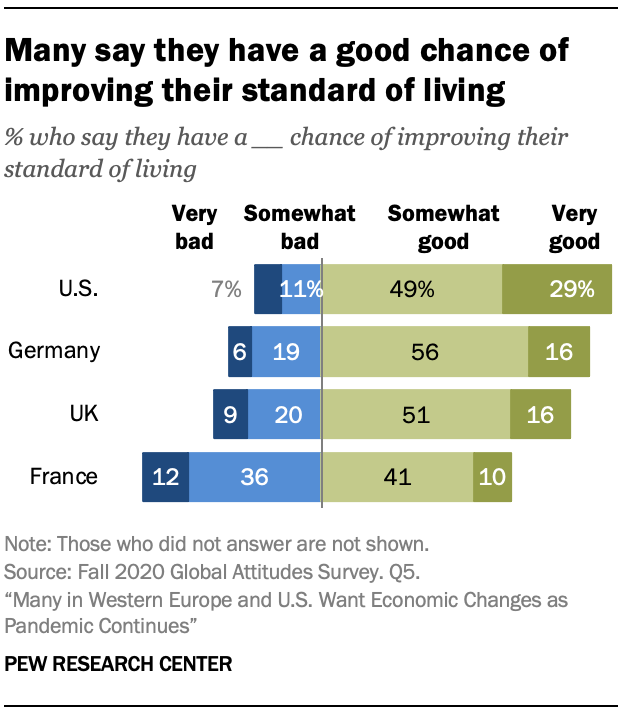

In the U.S. and France, younger people and women are more optimistic. When it comes to income, Germans, Americans and Britons in the highest income group are more likely than those in the lowest income group to say they have a good chance to improve their standard of living. Still, even among this lowest group, more than six-in-ten in Germany, the U.S. and UK say they have a good chance to do so.
_____________________________________________________________
Original post can be found here: https://www.pewresearch.org/global/2021/04/22/many-in-western-europe-and-u-s-want-economic-changes-as-pandemic-continues/
Methodology
BY KAT DEVLIN, SHANNON SCHUMACHER AND J.J. MONCUS
About Pew Research Center’s Fall 2020 Global Attitudes Survey
Results for the survey are based on telephone interviews conducted under the direction of Gallup and Abt Associates. The results are based on national samples, unless otherwise noted. More details about our international survey methodology and country-specific sample designs are available here.
Acknowledgments
BY KAT DEVLIN, SHANNON SCHUMACHER AND J.J. MONCUS
This report is a collaborative effort based on the input and analysis of the following individuals.
Kat Devlin, Research Associate
Shannon Schumacher, Research Associate
J.J. Moncus, Research Assistant
Sara Atske, Associate Digital Producer
James Bell, Vice President, Global Strategy
Alexandra Castillo, Research Methodologist
Aidan Connaughton, Research Assistant
Stefan S. Cornibert, Communications Manager
Claudia Deane, Vice President, Research
Moira Fagan, Research Analyst
Janell Fetterolf, Research Associate
Christine Huang, Research Analyst
Michael Keegan, Senior Information Graphics Designer
David Kent, Senior Copy Editor
Nicholas O. Kent, Research Assistant
Gar Meng Leong, Communications Associate
Clark Letterman, Senior Survey Manager
Gracie Martinez, Administrative Coordinator
Mara Mordecai, Research Assistant
Martha McRoy, Research Methodologist
Patrick Moynihan, Associate Director, International Research Methods
Julia O’Hanlon, Communications Associate
Stacy Pancratz, Research Methodologist
Jacob Poushter, Associate Director, Global Attitudes Research
Laura Silver, Senior Researcher
Richard Wike, Director, Global Attitudes Research





















